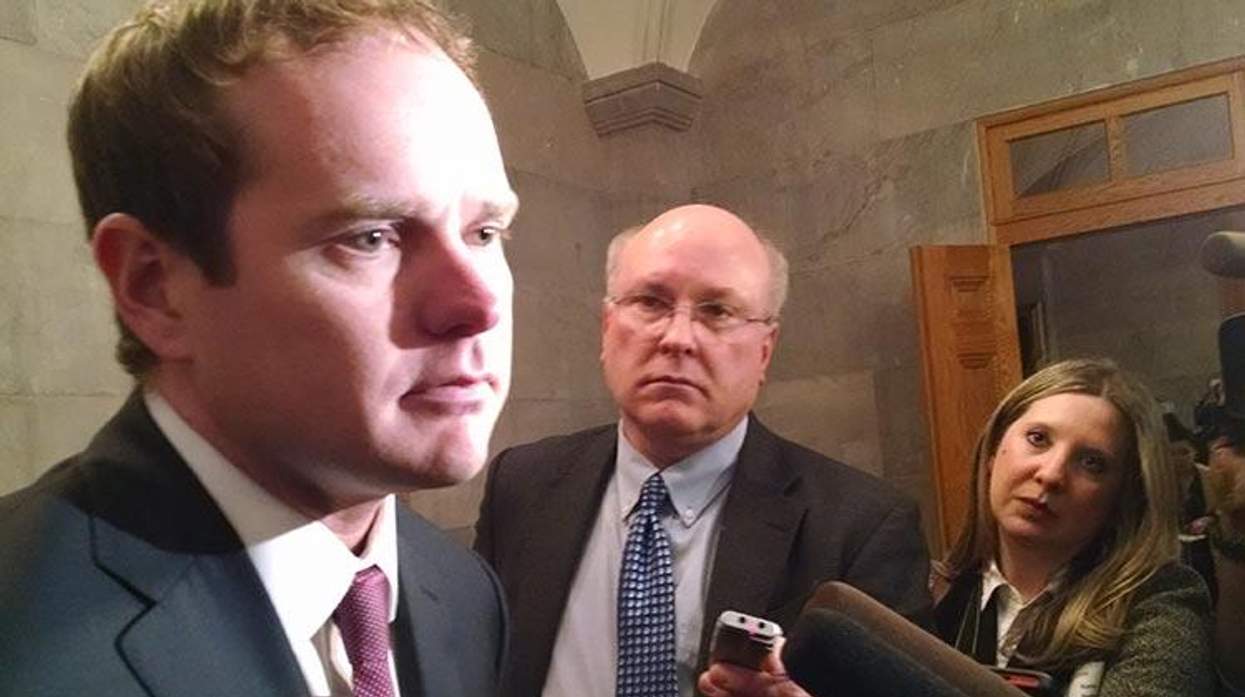Amid all the talk in Tennessee about the alleged (and unfounded) dangers of allowing transgender students in bathrooms and locker rooms with cisgender (nontrans) students, it turns out one of the key sponsors of the state's anti-trans legislation is facing pressure to resign because of his own history of alleged sexual harassment.
Tennessee Republican Rep. Jeremy Durham is one of the sponsors of the House Bill 2414, which last week passed the House Education Administration and Planning Committee. HB 2414 and its companion, Senate Bill 2387, aim to prohibit students in public elementary and secondary schools, colleges, and universities or institutions of higher education, from using the bathrooms or locker rooms that comport with their gender identity. The bills mirror provisions of the controversial anti-LGBT laws recently passed in North Carolina and Mississippi, and are near carbon-copies of legislation vetoed by South Dakota's Republican governor last month after nationwide outcry.
Proponents of anti-trans "bathroom bills" often rely on the repeatedly debunked argument that allowing trans people access to the correct restrooms for their gender identity would place women and girls in danger of harassment or violence by men "pretending" to be transgender. There has never been a verified report of such an assault taking place anywhere in the country, and law enforcement officials nationwide have repeatedly confirmed that adopting trans-inclusive nondiscrimination protections has never precipitated an uptick in sexual assault.
But Durham is accused of harassment himself -- not in restrooms, but elsewhere.
Tennessee's House speaker, Republican Rep. Beth Harwell, recently announced that she's moving Durham's office across the street and limiting his access to the House floor, CBS News reports. Harwell's actions follow an investigation into Durham's conduct by the state attorney general, which included testimonies by 34 women, including politicians, lobbyists, and various staffers. Reports of harassing text messages and sexually suggestive in-person behavior dogged Durham, with some women saying he plied them for their contact information; others said they were fearful of being alone with him. Many women hesitated in reporting the behavior because they feared losing their jobs or being seen as "untrustworthy" by their superiors.
Durham denies creating hostile work environments. "I know for a fact I've never sexually harassed anybody," he told Nashville TV station WTVF recently. "If I've sent a text message that I shouldn't have and someone will present it to me I'm happy to address it, and I'll take responsibility."
Even so, Durham resigned as House majority whip in January, and left the Republican caucus amid the scandal. Fellow Republicans, including Gov. Bill Haslam, want Durham to leave the legislature altogether.
This is not the first time the Nashville politician has been accused of wrongdoing. He wrote a letter -- on House stationery, no less -- in support of a pastor who pleaded guilty to statutory rape and possessing child pornography. He also has been accused of altering prescriptions, but no charges were ever filed.
Meanwhile, Tennessee's LGBT citizens await the fate of HB 2414, which would conflict with federal protections guaranteed to transgender students under current interpretations of Title IX of the Education Amendments of 1972, potentially costing the state $3 million in federal education funding. It also could cost Nashville nearly $60 million in lost tourism income.
















Charlie Kirk DID say stoning gay people was the 'perfect law' — and these other heinous quotes
These are some of his worst comments about LGBTQ+ people made by Charlie Kirk.